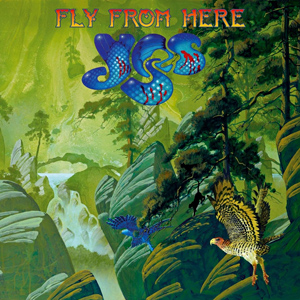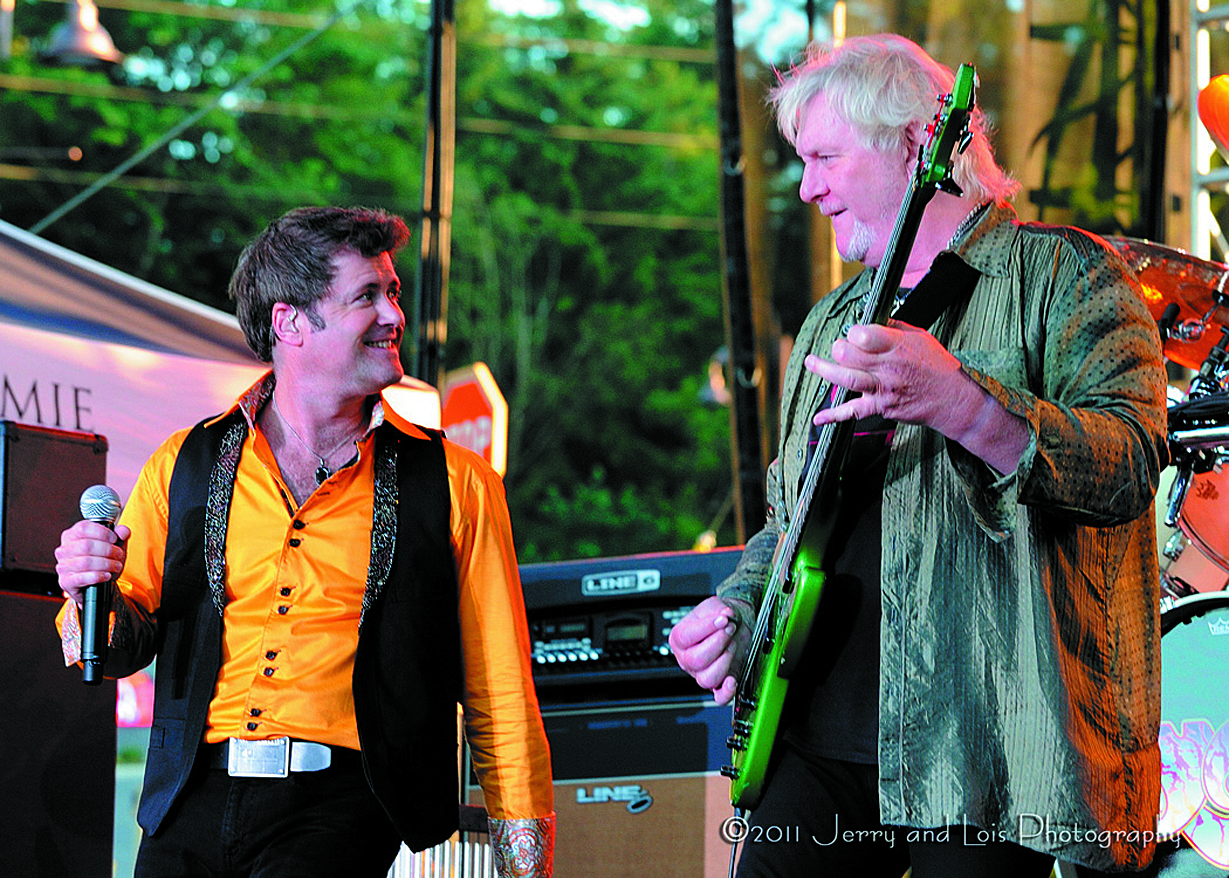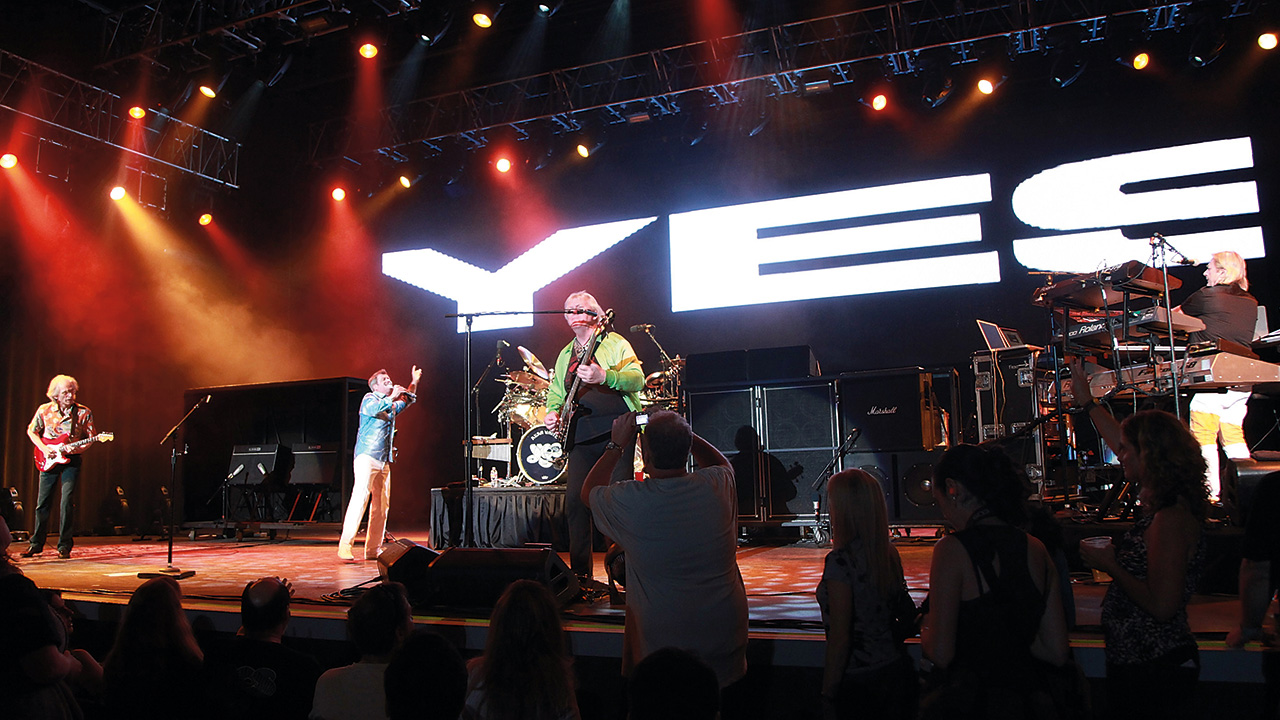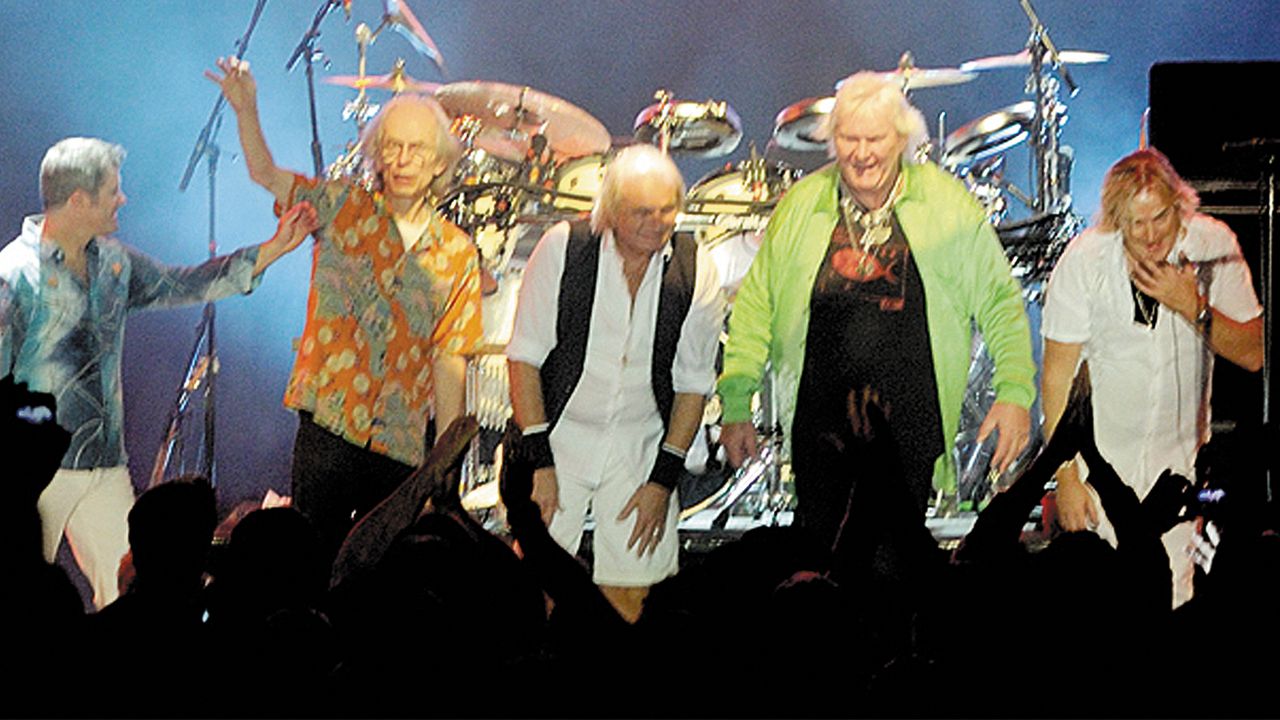Yes are no strangers to change, but the latest line-up modulations and the album Fly From Here – their first in 10 years and most successful for almost twice as long – seem to have driven one faction of fans and online commentators to delirium. There’s been heated debate over whether the band can pull off the absence of Jon Anderson, the shift (or return) to a shiny, modern Trevor Horn-helmed sound with Geoff Downes replacing Oliver Wakeman, and the introduction of French-Canadian vocalist Benoît David, once vocalist with Yes tribute band Close To The Edge.
The mild-mannered Benoît politely points out he’s been with the band for over three years and 200 shows now, while Geoff Downes is similarly conciliatory, despite – or perhaps because of – a recent online spat with a prog forum. “Has Fly From Here split the fans?” he says. “To some extent. We’ve had a lot of really good comments, and others are happy to be less complimentary. The majority of fans are still very much behind us. It’s nice that they’re enjoying Benoit as a vocalist now. He’s made a difference, and it’s an album where he’s the main man, so that helps the way people perceive the band. Hopefully we can move forward from that. Okay, I had a bit of a joust with a few fans, but it was all in good fun! Ultimately they appreciate me actually giving some background to the situation and the album.”
“Look,” sighs Chris Squire, “there’s always going to be your dyed-in-the-wool Jon Anderson fans. There’s going to be some people happy and some people moaning. But Benoît’s done really well and it was good to actually get an album done, because it’s been frustrating for me, not coming out with any new material for 10 years. There have been various circumstances leading to that, but to get down to work, and get one finished – surely the fans see that’s a very healthy thing.”

Those “various circumstances” of course, previously reported in Prog, involved Anderson becoming seriously ill and a 2008 tour being cancelled. (Anderson tells me he’s now “totally” well. “Everybody goes through this crap, y’know?” he says. “I’m so blessed I’m not in hospital. I did it, and I don’t want to go there again. So I’m writing more music and everything’s a new experience now. I’m taking more drugs than ever – but they’re for keeping me alive. That’s a joke...”) Squire has borne the brunt of criticism from those unhappy few painting him in the “breadhead” corner (as opposed to the “spirituality” corner of Team Anderson), but he’s a laconic character who asserts that he’s a major force in keeping Yes alive.
“I’ve never had such a long period between albums”, he emphasises. “And part of the reason for playing live, the joy of it, is having something new to present. People appreciate that. I’ve always said: I’m not a big fan of legend-peddling, where you’re still playing a couple of hit albums you had 40 years ago.”
On Yes’ summer tour of the States (on most shows they were paired with Styx), some – if not all – of Fly From Here was introduced. “We were limited on time”, admits Squire. “But for the [imminent] European shows we’ll be adding a lot more of it.” “To do that 20-minute piece in full,” muses Downes, “will be quite a challenge.” The spectacularly soaring suite that dominates the album began life as a shorter song, which first appeared during the Drama era. (A version appeared on the live album The Word Is Live, and another emerged on Buggles’ reissued Adventures In Modern Recording). Large chunks of it are credited to Horn/Downes, though arguably Steve Howe’s quirky Bumpy Ride section is what lifts it from pastiche to paean. And it’s to that Drama era that the band members frequently refer when discussing the current state of play. With Horn and Downes back in the fold, there are also echoes of 90125 and Big Generator. Fear not, though: it’s not all ludicrously loud, random stabs of Linn drums. Rather, Fly From Here sees Horn allowing the musicians to do what they’re best at (Howe is on particularly fine form), while packaging the whole in a flawless spick-and-span studio sheen like only he (and his trusted team, who the band are keen to credit) can. The result is an album that, while never in a million years emulating, or even pretending to emulate, the euphoria and astral experimentalism of 70s Yes, tips a hat to accessible, booming 80s Yes. The band came back from the near-comatose then with a joy-of-robots sound that, if anything, sounds weirder now than it did at the time. Fly From Here sweeps on from that template, with the titular centrepiece moving through welcome passages of grandeur, melancholy and fleeting spells of humanised beauty. It’s also tricky and audacious, recalling in bursts the genre-hopping and disregard for “the done thing” of heyday 10cc.
“There’s a lot more richness, a settled feeling, a composure”, offers Steve Howe, “as opposed to the frantic searching of some of our 70s heritage. Yet Trevor’s very aware of our past, and he was fighting for something on this record which wasn’t only about good use of his and our material, but about it standing up well against our history, which I think it does. It’s serene. It’s got more beauty in the sense that it’s given time to be beautiful. It isn’t in a hurry; it isn’t cramped. It isn’t overly arranged or dubbed; it has some air in it. Which all great things do. If you pause in music, that makes you wonder what’s going to happen next. That’s preferable to too much playing together. Sure, we’re good at that, but we tried to leave things out sometimes here. I think we’ve got a handle on it again.”

Does Yes music transcend the personnel?
“It wasn’t easy having to stop work with Oliver”, says Howe. “He did nothing wrong and we loved him. But something happened with Geoff and it seemed to be a group, with an extra dynamic, which Benoît noticed at once. And if you believe that other people believe in the same thing, then even if they don’t always go about it the same way that you might, you’ll get to the same point. And, hopefully, a lot easier than that sentence just did!”
All are quick to applaud über-producer Horn. “Well, of course, he’s very experienced at producing records!” chuckles Squire. “He knows what he likes, but leaves it to his team to get it to a certain point. The germ of the Fly From Here piece was written at the beginning of the 80s, and when I asked Trevor if he wanted to get involved with the production we got talking about that song. We’d never done a proper studio recording. The conversation moved on to: shall we do it the same, or try to expand it into a classic long-form Yes piece of work?” “We’d never got these themes to any level of finesse during the Drama era”, says Downes. “It’s evolved now. With Trevor, you get the high-tech end of things, but you still have the musicianship of these guys. Yes is always something that doesn’t sound like anything else, because of these original players. I think it’s very much a Yes album, albeit one without Jon.”
Drummer Alan White, with whom I just catch a few words on a crackly transatlantic line because he’s about to jump on a plane, says, “It was interesting doing something like a concept piece again, where it all fits together, with good themes and storylines. I’m very happy with it. Geoff was always a great part of the band around Drama. And with some of us having played together for 40 years – I’m only at 39 myself – we tend to understand where it might go next, what to wait for, how it should feel.” Asked if we can expect the whole of Tales From Topographic Oceans during the European shows, he first wonders if I’m joking (I wonder that too) then laughs, “There will be old and new. We’re all proud of what we’ve done over the years. Certain songs we play because we can’t get away without playing them. I recall one show where we tried not to play Roundabout and it wasn’t pretty.”

Downes also acknowledges that however impressive the new work is, Yes’ past body of work is not easily dismissed. “Obviously we’re conscious of the fact that Yes have a 20-album history so we’ll be looking at a lot of that material too. But expect a big dose of Fly From Here. It’ll be a solid evening of Yes music. With such a rich catalogue of epic pieces, it’s very difficult to cherry-pick. But having said that...” “There may be a surprise or two,” reveals Howe. “It’s dangerous to be predictable. We’ll show that we, like our fans, care about the repertoire. I’m happy Solitaire (his solo piece) is on the album, because it shows how I’m writing and playing guitar now. But the arrangements on Fly From Here demonstrate what the band’s good at; what happens when we put our music together. That’s what Yes has always been about. If things aren’t surprising, maybe they shouldn’t be there!”
But what makes Yes Yes? After all these revolving doors and musical chairs, when would a Yes album not be a Yes album?
“Of course there are diehards for certain members”, Howe continues. “But more dominant are diehards for the band, irrespective of who’s in it.”
“Yes is a style of music that reinvents itself from time to time,” says Downes. “It takes its own course, changes direction, with lots of people involved.”
Squire, who’s finished an album with Steve Hackett under the provisional name Squackett (as well as guesting on Hackett’s new solo album), has hinted that there might be another Yes album in a similar vein relatively soon. To this, Howe says, “I think that’s quite ridiculous. When I think of the accumulation of small and grand ideas it took to make this one, I don’t see how Chris is saying that! Until, say, 2013, there's not a chance.”
Could Yes go on forever?
“Well,” laughs White, harangued to board his flight, “sometimes it feels like it does...”
This article originally appeared in issue 20 of Prog Magazine.

